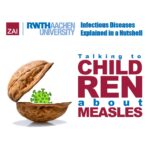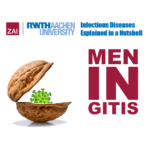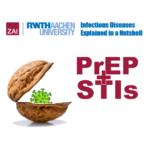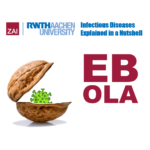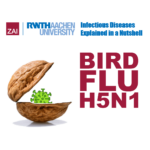Schlagwort: ‘Vaccination’
Have you already had measles, the most devastating childhood disease?
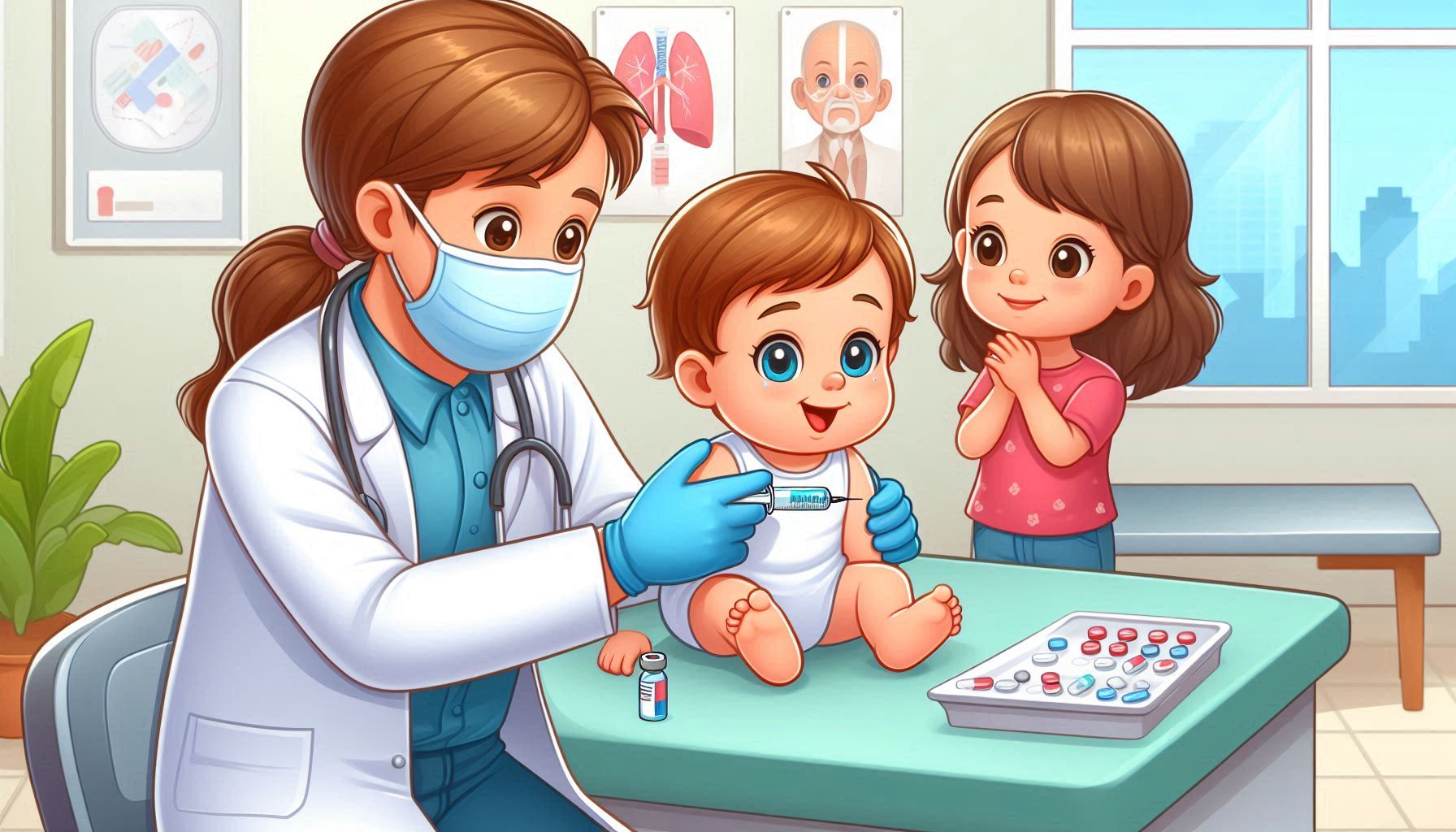
Disclaimer!
This article and its major media content are produced by students to train science communication as part of a lecture about human infectious pathogens. The article does not represent official advice from the authorities. For authorized information about the disease in question, please refer to the official health authorities in your country or the World Health Organization.
By Laura Emonds, Anna Schwartz & Franziska Steffens
Have you ever heard of the term “childhood disease”? And have you wondered why, as for the
term, only children can get sick? Why not Mom and Dad, too? We will follow Mandy*, an eightyear-
old girl, who learns about the measles disease during the current outbreaks in the USA.
Only a childhood disease?
Mandy comes home from primary school and is fed up. Instead of meeting her best friends
she must come along to her baby brother Jack’s doctor’s appointment. Her parents explain to
her that Jack will be vaccinated against measles, a childhood disease. Now Mandy is intrigued
as one of her classmates is currently sick with measles. What is a childhood disease?
Diseases are called a childhood disease when the first infection happens during the childhood.
Infected people gain lifelong immunity, which means that they won’t suffer from the same
disease again. Therefore, children get infected more often than adults. Nevertheless,
unimmunized adults can fall ill with a childhood disease, too.
And what does an infection with measles look like? Mandy watches this video that explains the
cause and symptoms of the measles disease:
Potential aftermaths of a measles infection
Those symptoms look pretty heavy, right? But most people get well after about two weeks by
treating the fever with antipyretics. Most people, but not all. A measles infection weakens your
immune system, your body’s police system against invading germs, and you can fall ill with
pneumonia or in very rare cases can suffer a meningitis. Because of these secondary
infections you can even die or suffer from lifelong consequences like paralysis.
How can you protect yourself against
measles?
Now don’t worry about getting infected with measles. These days most children are vaccinated
at age one against measles just like Mandy and her brother Jack. Maybe ask your parents if
you have been vaccinated against measles. A vaccination protects you from an infection.
There are vaccinations not just for measles but for many other diseases like e.g. chickenpox,
too. Listen to the pediatrician, who answers Mandy’s questions and explains how vaccinations
work and why they need to inject the vaccine into your arm with a syringe.
You see, a vaccination is the best way to protect you and the people around you from getting
infected as the measles disease isn’t just a harmless childhood disease. An infection can have
lethal consequences for young and adults. In some countries like eg. Germany or the USA a
vaccination against measles is compulsory for attending day care and schools as the STIKO**
stated:
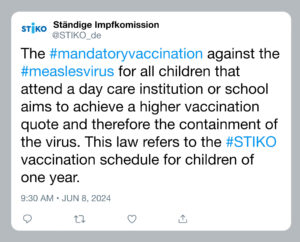
However, some people fear side effects of a vaccination or insist on their right to selfdetermination
over their own body and reject the vaccination. Nevertheless, objectively
speaking the benefits of a vaccination outweigh an unlikely risk of vaccination side effects and
prevent horrible, potential lethal courses of a measles infection.
This evening Mandy falls asleep knowing that she and her loved ones are safe just because
of one little prick.
*fictional character
**fictional social media post
About the authors:
Traveling to Africa as a Gap Year Adventure: Understanding the Risk of a Meningitis

Source: pixabay
Disclaimer!
This article and its major media content are produced by students to train science communication as part of a lecture about human infectious pathogens. The article does not represent official advice from the authorities. For authorized information about the disease in question, please refer to the official health authorities in your country or the World Health Organization.
By Franziska Broeske and Yuko Tanabe
Thinking about going on an exciting gap year adventure to Africa? Exploring new cultures, wildlife, and stunning landscapes can be an incredible experience. However, it’s important to be aware of potential health risks, including meningitis, and take necessary precautions for a safe and unforgettable journey.
The Meningitis belt
Meningitis is a bacterial infection that affects the protective membranes surrounding the brain and spinal cord. In Africa, especially in the sub-Saharan region known as the „Meningitis belt“, meningitis is more common compared to other parts of the world. Moreover, it is important to stay informed about the current infections during your trip. Keep in mind that the dry season is the most dangerous, with the risk of an infection being significantly higher. When you are interested in the latest outbreak and how the government handles the recurring outbreaks, you can read the comment, “Meningitis outbreak in Nigeria: Nigeria’s Inadequate Response to Devastating Meningitis Outbreak”, published in the newspaper TERRA*. The author criticizes the Nigerian government during the latest meningitis outbreak between October 2022 and April 2023. The bacteria involved in this outbreak are primarily Streptococcus pneumoniae and Neisseria meningitidis, which cause meningitis in young adults.
Cause and symptoms of the disease
These specific bacteria, which cause meningitis, are primarily transmitted through respiratory droplets, often spread by coughing, sneezing, or close contact with an infected person. Places like hostels, public transportation, or social gatherings can increase the risk of exposure. It is important for you to recognize the symptoms (fever, headache, vomiting …) and to be informed about the risks of a meningitis infection. Therefore, we suggest the video “Human Pathogens: Meningitis” for you to learn key facts about the infection and what actually happens in your body when you are infected with Streptococcus pneumoniae.
—
Prevention of a meningitis infection
One of the most effective ways to safeguard against meningitis is through vaccination. Conjugate vaccines are available and recommended for travelers visiting high-risk areas, including sub-Saharan Africa. Consult a healthcare professional or a travel clinic well in advance of your trip to receive the necessary vaccinations and understand the recommended schedule. To find out more about bacterial meningitis and its prevention, listen to the interview with Dr. Mark van der Linden, the head of the reference laboratory for streptococci at the Institute of Medical Microbiology at RWTH Aachen University Hospital.
—
Additional advice for a safe trip
In addition to vaccinations and vigilance, maintaining a healthy lifestyle during your trip is important. A balanced diet, regular exercise, and sufficient rest can strengthen your immune system, reducing the chances of infection. Don’t forget to purchase comprehensive travel insurance that covers medical expenses, including emergency medical evacuation. Accidents and unforeseen circumstances can occur, and having adequate insurance will provide peace of mind throughout your adventure.
Traveling to Africa during your gap year can be a transformative experience. By understanding the risks associated with meningitis and taking proactive measures, you can fully embrace the beauty of the continent, immerse yourself in diverse cultures, and create lifelong memories. Remember, your health and safety are of utmost importance, so plan wisely, stay informed, and enjoy an incredible journey exploring the wonders of Africa!
* fictional newspaper
About the authors:
 Franziska Broeske
Franziska Broeske
Master student in Biology “Medical life science”
RWTH Aachen University
 Yuko Tanabe
Yuko Tanabe
Master student in Biology “Medical life science”
RWTH Aachen University


